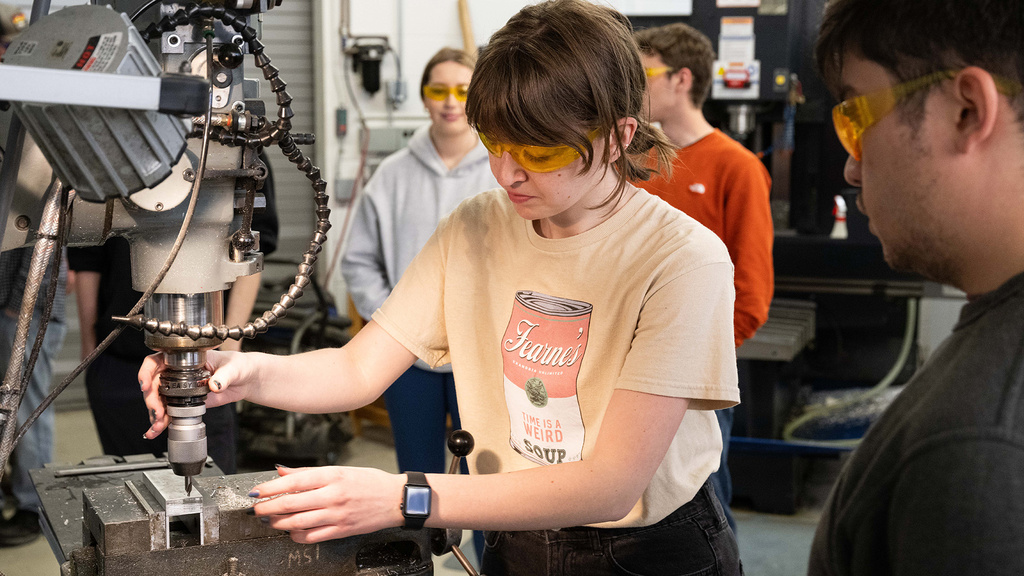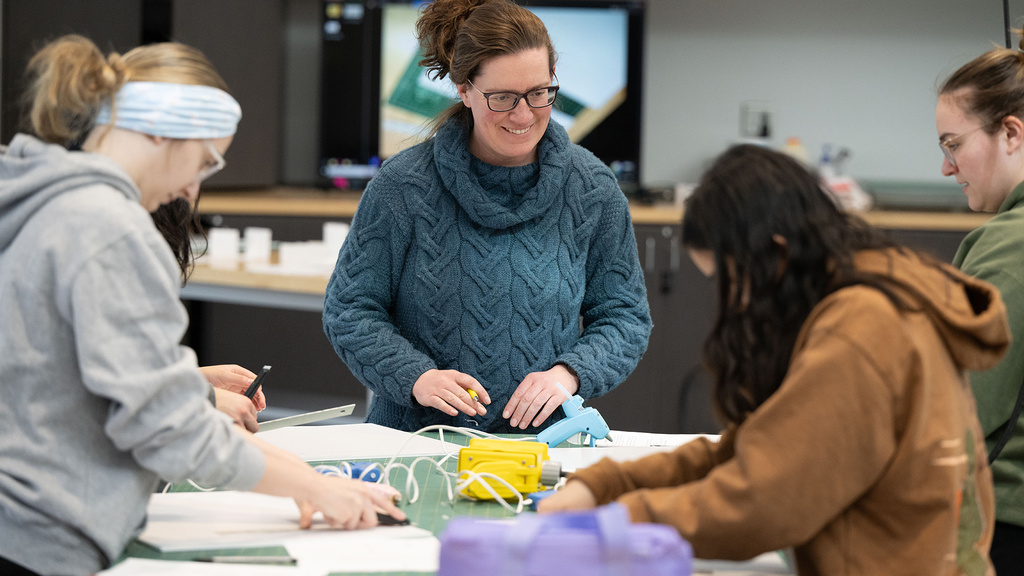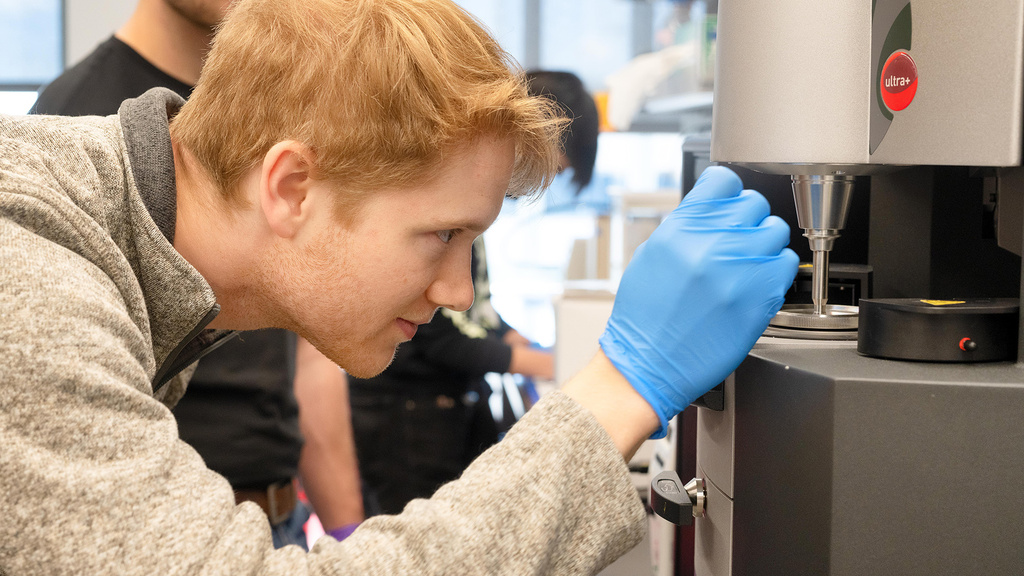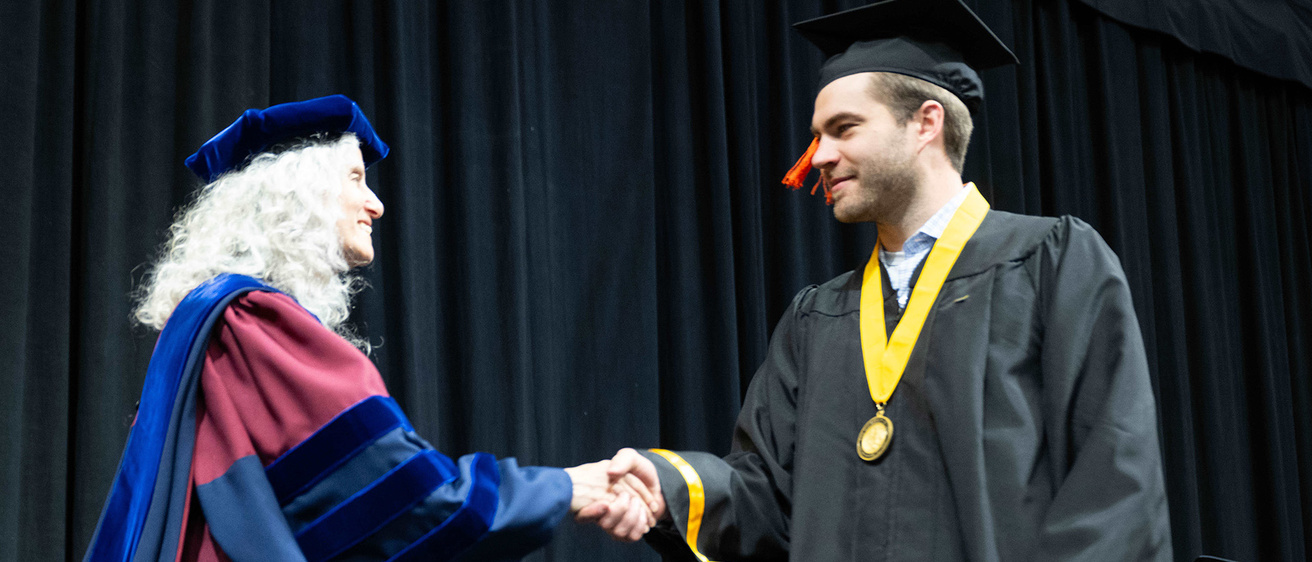You can do this in four years. But don’t overlook valuable opportunities, even if they end up extending your timeline.
While the answer to the question, “How long does a biomedical engineering degree take?” might seem readily apparent — four years, right? — it’s a fair question to ask, for a number of reasons. Perhaps you simply can’t wait to start your career as a biomedical engineer and want to know if it can be done faster. Maybe you are mapping out higher-education expenses. Or you might be thinking about specific jobs that would require advanced degrees (master’s degrees or a PhD), and want to understand how much extra time goes into earning those qualifications.
Most undergraduate biomedical engineering degree requirements take about four years to complete. However, timelines can shift depending on whether you pursue co-ops, research opportunities, or dual degrees, and whether you come to campus with college credit in hand from AP classes or college courses you took while in high school.
If you’re concerned about finishing in a typical amount of time, you should know that support systems are out there. At the University of Iowa, a structured curriculum helps students graduate on time while still gaining valuable experiences that prepare them for careers in this dynamic field.
How many years does a biomedical engineering degree take?
A typical undergraduate biomedical engineering degree program takes four years of full-time study. During that time, you’ll complete a mix of engineering, science, and general education courses, along with labs and design projects that build hands-on skills.
Note that we used the word “typical” above. Let’s address factors that can extend your timeline:
- Dual degrees or minors, which may require additional coursework. Your goals might lead you to get a bachelor’s degree in another engineering discipline (mechanical, electrical, chemical) or a field such as public health, business, or a life/health science.
- Internships, which provide real-world experience (and, in some cases, financial compensation) but potentially lengthen your degree pursuit to four-and-a-half or five years.
- Undergraduate research projects, which can enrich your résumé and help prepare you for graduate school.
Another thing about “typical”: that doesn’t necessarily mean it’s the right fit for you. Biomedical engineering coursework is demanding, and a pace or workload that leads to an extra semester or year might be your best path to long-term success.
“Typically, the degree in biomedical engineering can be completed in four years or eight semesters — it just kind of depends on the best approach for each individual student,” says Josh Atcher, director of academic advising and student support in the University of Iowa College of Engineering. “Sometimes that might be four-and-a-half years or five years, depending on how many courses you feel comfortable taking each semester. Usually, they're pretty packed full of math, science, and engineering coursework, and taking five really difficult classes is not everyone's favorite idea. So, spreading that out over summer sessions and other semesters can be a good approach.”
Looking beyond the bachelor’s degree, some graduates choose to pursue a master’s degree or PhD. A master’s program typically adds two years, while a PhD can take four to six years. We’ll address these degrees in a little bit.

How do I prepare for a biomedical engineering degree?
You should start preparing well before college. While in high school, you should focus on STEM courses — biology, chemistry, physics, and advanced math are a must. These areas form the foundation of engineering.
Equally important are the development of certain traits and mindsets that support success in engineering, things that you don’t necessarily get by signing up for certain classes in high school. First off, be curious! Develop the drive to explore complex issues. You’ll also hear biomedical engineering faculty and professionals talk about the desire (and need) to solve problems. Challenge yourself to analyze things and develop solutions based on what you observe. And get experience with hands-on projects, which you can do through robotics clubs, science fairs, or lab-based coursework.
Here's another word you might hear a lot as you transition to college-level engineering: rigor. College students often face heavier workloads, faster-paced classes, and more technical projects. The good news: Programs such as the one found at the University of Iowa have academic advising and tutoring services to help students adjust and thrive. As you look for the best college for biomedical engineering for you, seek programs that foster collaboration over competition.
For more details on coursework expectations, check out more information on biomedical engineering degree requirements — a critical resource for planning your path.
Is a master’s or PhD in biomedical engineering degree worth it?
It depends on your goals, but both can unlock opportunities.
A master’s degree in biomedical engineering is ideal if you’re looking to:
- Specialize in fields such as medical imaging, biomaterials, or tissue engineering
- Gain technical depth for roles in research, product development, or leadership
- Improve your job prospects
- Prepare for future PhD study or a career in academia
It’s especially valuable for students aiming to advance quickly in industry or explore emerging technologies. Working professionals may consider pursuing a non-thesis master’s degree.
A PhD in biomedical engineering is a long-term investment suited for those who want to:
- Lead advanced research or teach at the university level
- Innovate in fields such as bioinformatics or tissue engineering
- Compete for research grants and shape public health or tech policy
- Gain deeper autonomy and leadership within research-focused organizations
While not required for most biomedical engineering careers, a PhD is essential for academic roles and high-level research positions. It offers unmatched expertise and opens doors to interdisciplinary collaboration across science, medicine, and engineering.
“The biggest advantage to earning a graduate degree in biomedical engineering is that it allows you to specialize and acquire in-depth expertise in a specific area, such as biomedical imaging, cellular engineering, computational bioengineering, or biomechanics,” says Mike Schnieders, a professor of biomedical engineering at the University of Iowa. “Developing that depth makes you even more attractive to industry.”

What can you do after earning a biomedical engineering degree?
Graduates with a biomedical engineering degree can go down a wide range of career paths. Whether you’re interested in research, developing innovative medical solutions, or working directly with health care professionals, there’s a biomedical engineering job for you.
Depending on the type of biomedical engineering you pursue, some jobs you might consider include:
- Clinical engineer: Make sure hospitals run smoothly with the latest tech.
- Instrumentation engineer Develop new equipment and software used in the creation and production of medical devices.
- Manufacturing engineer: Develop and refine processes for manufacturing medical devices or products so they can be marketed.
- Medical device design: Build tools that save lives, from pacemakers to robotic surgery systems.
- Quality engineer: Ensure that medical devices meet FDA standards for safety and efficacy.
- Regulatory affairs specialist: Help bring new medical products to market safely and legally.
- Rehabilitation engineer: Design, build, and adapt technology to help people with disabilities increase their functional abilities and independence.
- Research and development (R&D) engineer: Work in labs to invent the next big thing in biotech or pharma.
- Software engineer: Responsible for the analysis, design, programming, debugging, and modification of software applications and testing solutions.
“The field of biomedical engineering continues to evolve quickly with advances in AI, wearable tech, and personalized medicine,” says Nicole Grosland, associate dean for academic programs and distinguished professor in the University of Iowa College of Engineering. “3D bioprinting, for example, is revolutionizing regenerative medicine, while digital tattoos provide a way to continuously monitor vital signs. The opportunities are endless.”
Related content

Biomedical engineering degree requirements: What you'll need, from start to finish

Which classes are best for biomedical engineering?

